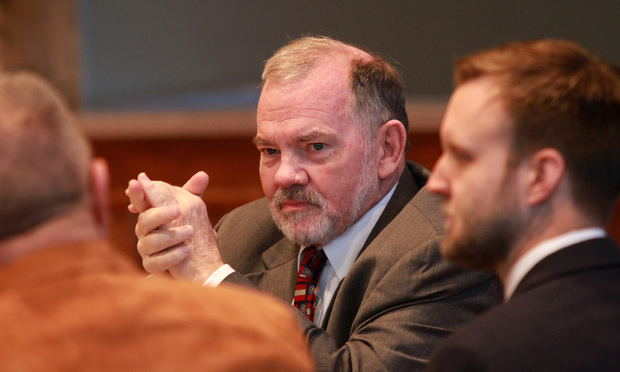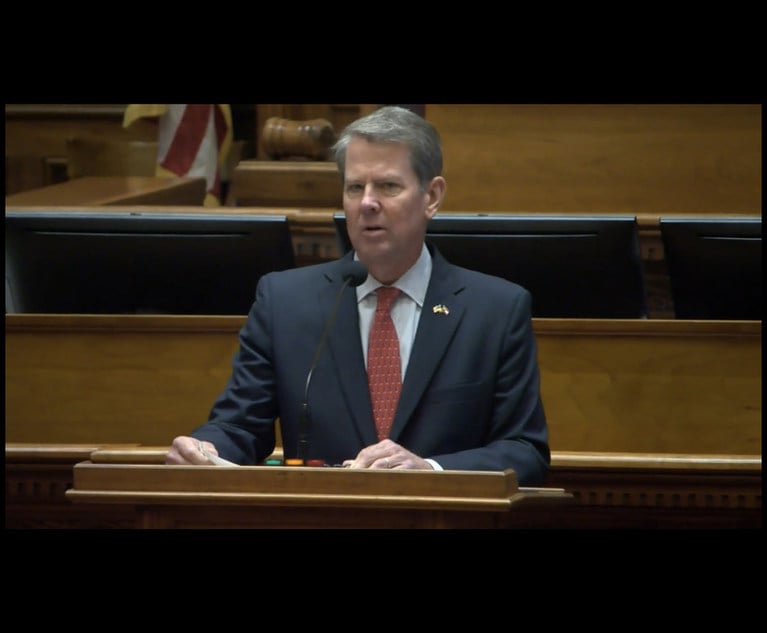Judge Says He Made 'Big Mistake' in Taking Registry Funds
Suspended since last fall and facing criminal charges over his decision to direct a clerk to pay him $15,675 from the court registry, Superior Court Judge Robert M. "Mack" Crawford contested ethics charges filed against him by the state judicial watchdog agency that could cost him his judicial post.
March 22, 2019 at 04:55 PM
6 minute read
 Judge Robert “Mack” Crawford, Superior Court, Pike County. At his JQC hearing on Monday February 25, 2019. (Photo: John Disney/ALM)
Judge Robert “Mack” Crawford, Superior Court, Pike County. At his JQC hearing on Monday February 25, 2019. (Photo: John Disney/ALM)
A Superior Court judge suspended last fall when he was indicted on charges of stealing $15,675 from the court registry told a state judicial watchdog panel Friday that he made “a big mistake” when he directed a court clerk to pay him the money.
But Judge Robert M. “Mack” Crawford insisted during the second day of an ethics hearing on charges that he violated the state Judicial Code of Ethics that he has a legitimate claim to money he deposited in the Pike County court registry 17 years ago for two former clients.
The ethics charges were filed last year by the state Judicial Qualifications Commission and, if upheld, could result in Crawford's removal from the bench.
Crawford deposited the funds in the court registry in 2002 to redeem client Dan Mike Clark's property after it was sold for back taxes.
Crawford said the money—which remained in the registry for 13 years after Clark died in 2004 and Clark's live-in partner, Bobbie Whalen, moved to Texas—was owed to him for unpaid legal fees, dating to when he was in private practice eight years before his appointment to the bench.
The property was never redeemed and another superior court judge closed the case in 2009 and ordered that the registry funds be disbursed to Clark, Whalen or their heirs. At that time, Crawford did not lay claim to the funds as promised legal fees. He has testified that he provided the court clerk with possible contact information for Whalen and for Clark's heirs so she could return the money.
Crawford also claimed Friday that, when he contacted one of Clark's brothers after Clark's death to give the funds to him, Crawford said the man told him he didn't want the money and to leave him alone or he would kill him.
In December 2017, when a court clerk in the Pike County courthouse where Crawford presided told the judge she intended to forward the money to the state as unclaimed funds, Crawford gave her a handwritten note directing her to pay him instead.
“I am so sorry,” Crawford told the JQC judicial panel on Friday. “If I had it to do over, would I do it different? Yes.”
Crawford said that, when he told Superior Court Clerk Carolyn Williams to pay him the money, “I am the one who suggested writing the note and putting it in the file.” But, he insisted, “It was not an order.”
“I do make mistakes,” he continued. But, he added, “I would like to keep my job. … I have given my whole life to my community.”
Crawford said that, in retrospect, he should have filed a petition or sought the appointment of an administrator to adjudicate the matter through the county probate court as assets of Clark's estate.
Crawford said that, when JQC Director Ben Easterlin first contacted him about the money, Easterlin urged him to return it. Crawford, who deposited the funds shortly before Christmas into a personal bank account that was more than $2,000 overdrawn, said, “It took me a few days to get it transferred. But I returned the money.”
Crawford said that, after he returned the funds, he asked the clerk to notify the state he had a claim. Instead, the Georgia Bureau of Investigation—which by then had begun investigating the judge—located Whalen and the state then forwarded the entire $15,675 to her, according to testimony at Friday's hearing.
Crawford also challenged Whalen's claim to the funds, contending that he had gotten $9,675 of the amount from the county tax commissioner after the tax sale, although the check was made out to a woman who had previously lived with Clark and was listed as the owner of record. Crawford said Clark paid him the $6,000 balance.
Fulton County Superior Court Chief Judge Robert McBurney, one of the three JQC hearing panelists, asked Crawford if Clark had survived and the property had been redeemed, how much Crawford would have charged him in legal fees.”That $15,000: Is it less? Is it more?” he asked.
“Sir, I don't know,” Crawford said. Crawford said in addition to the initial work he did to redeem the property where Clark and Whalen lived, he also defended Clark after his arrest following a fistfight with a repo man. Clark never paid him for that, either, Crawford said.
Crawford's lawyer, former Georgia Gov. Roy Barnes, argued that, although the JQC ethics charges accuse Crawford of ordering the court clerk to turn the money over, both the clerk and Crawford testified that the judge never issued a formal court order. And, he added, “You have no jurisdiction, respectfully, over anything that occurred before he became a judge.”
Barnes also said that, while Crawford did not follow the proper legal procedure in laying claim to the money, “Making a mistake on the law is not a violation of the canon of ethics. … This is a civil dispute on who is entitled to the funds.”
Barnes also predicted that the pending criminal case against Crawford will never go to trial, and, if it does, “They will not convict him.”
But Easterlin questioned why Clark said nothing for more than a decade about being owed the registry funds, even after Clark died and the case to redeem the property was eventually dismissed. “It's inconceivable that he would not have tried to get those funds for himself, if they were due to him at that time,” Easterlin contended.
Crawford, he added, “has proven on several occasions he is willing to say or do something that is not really truthful, if that's what it takes to get what he wants. … Being sorry is not an excuse. Restitution does not eliminate the crime.”
This content has been archived. It is available through our partners, LexisNexis® and Bloomberg Law.
To view this content, please continue to their sites.
Not a Lexis Subscriber?
Subscribe Now
Not a Bloomberg Law Subscriber?
Subscribe Now
NOT FOR REPRINT
© 2025 ALM Global, LLC, All Rights Reserved. Request academic re-use from www.copyright.com. All other uses, submit a request to [email protected]. For more information visit Asset & Logo Licensing.
You Might Like
View All
Panel to Decide if Governor Should Suspend Georgia Lawyer From Elected Post
4 minute read

Plaintiffs Attorneys Awarded $113K on $1 Judgment in Noise Ordinance Dispute
4 minute readTrending Stories
- 1Gunderson Dettmer Opens Atlanta Office With 3 Partners From Morris Manning
- 2Decision of the Day: Court Holds Accident with Post Driver Was 'Bizarre Occurrence,' Dismisses Action Brought Under Labor Law §240
- 3Judge Recommends Disbarment for Attorney Who Plotted to Hack Judge's Email, Phone
- 4Two Wilkinson Stekloff Associates Among Victims of DC Plane Crash
- 5Two More Victims Alleged in New Sean Combs Sex Trafficking Indictment
Who Got The Work
J. Brugh Lower of Gibbons has entered an appearance for industrial equipment supplier Devco Corporation in a pending trademark infringement lawsuit. The suit, accusing the defendant of selling knock-off Graco products, was filed Dec. 18 in New Jersey District Court by Rivkin Radler on behalf of Graco Inc. and Graco Minnesota. The case, assigned to U.S. District Judge Zahid N. Quraishi, is 3:24-cv-11294, Graco Inc. et al v. Devco Corporation.
Who Got The Work
Rebecca Maller-Stein and Kent A. Yalowitz of Arnold & Porter Kaye Scholer have entered their appearances for Hanaco Venture Capital and its executives, Lior Prosor and David Frankel, in a pending securities lawsuit. The action, filed on Dec. 24 in New York Southern District Court by Zell, Aron & Co. on behalf of Goldeneye Advisors, accuses the defendants of negligently and fraudulently managing the plaintiff's $1 million investment. The case, assigned to U.S. District Judge Vernon S. Broderick, is 1:24-cv-09918, Goldeneye Advisors, LLC v. Hanaco Venture Capital, Ltd. et al.
Who Got The Work
Attorneys from A&O Shearman has stepped in as defense counsel for Toronto-Dominion Bank and other defendants in a pending securities class action. The suit, filed Dec. 11 in New York Southern District Court by Bleichmar Fonti & Auld, accuses the defendants of concealing the bank's 'pervasive' deficiencies in regards to its compliance with the Bank Secrecy Act and the quality of its anti-money laundering controls. The case, assigned to U.S. District Judge Arun Subramanian, is 1:24-cv-09445, Gonzalez v. The Toronto-Dominion Bank et al.
Who Got The Work
Crown Castle International, a Pennsylvania company providing shared communications infrastructure, has turned to Luke D. Wolf of Gordon Rees Scully Mansukhani to fend off a pending breach-of-contract lawsuit. The court action, filed Nov. 25 in Michigan Eastern District Court by Hooper Hathaway PC on behalf of The Town Residences LLC, accuses Crown Castle of failing to transfer approximately $30,000 in utility payments from T-Mobile in breach of a roof-top lease and assignment agreement. The case, assigned to U.S. District Judge Susan K. Declercq, is 2:24-cv-13131, The Town Residences LLC v. T-Mobile US, Inc. et al.
Who Got The Work
Wilfred P. Coronato and Daniel M. Schwartz of McCarter & English have stepped in as defense counsel to Electrolux Home Products Inc. in a pending product liability lawsuit. The court action, filed Nov. 26 in New York Eastern District Court by Poulos Lopiccolo PC and Nagel Rice LLP on behalf of David Stern, alleges that the defendant's refrigerators’ drawers and shelving repeatedly break and fall apart within months after purchase. The case, assigned to U.S. District Judge Joan M. Azrack, is 2:24-cv-08204, Stern v. Electrolux Home Products, Inc.
Featured Firms
Law Offices of Gary Martin Hays & Associates, P.C.
(470) 294-1674
Law Offices of Mark E. Salomone
(857) 444-6468
Smith & Hassler
(713) 739-1250







